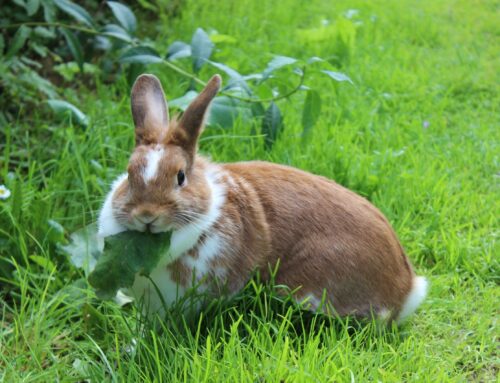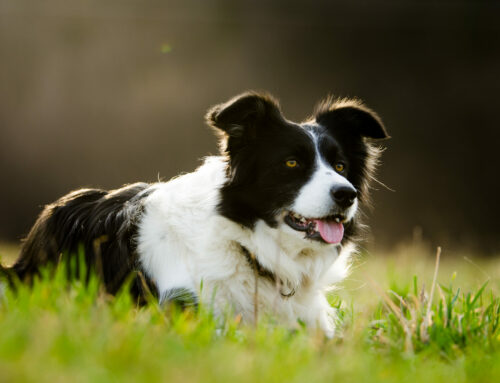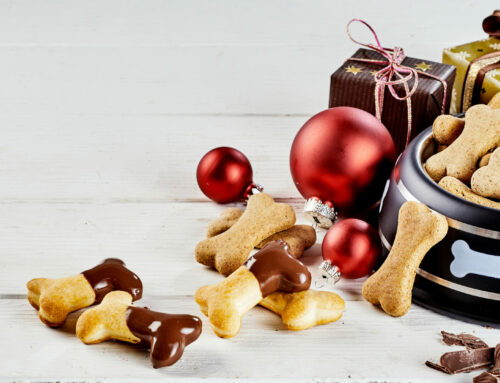Christmas is a time for celebration, but it can also bring with it some seasonal dangers for our pets. Keep reading for a list of some of the most common pet-related hazards that the festive season can bring.
Christmas trees, presents and decorations
Christmas decorations can be very intriguing to curious pets and can be tempting to chew on or swallow.
- Pine needles from the Christmas tree can cause tummy upsets and the sharp points can cause damage to the stomach and intestines. They can even hurt incautious paws if trodden on!
- Tinsel and ribbons may be played with and swallowed, causing gastrointestinal blockages.
- Baubles can shatter or break if chewed, causing damage to the mouth or to the stomach if swallowed.
- Fairy lights can cause burns or electrocution if the cables are chewed.
- Presents may contain toys with small parts that could be swallowed and become lodged in the oesophagus, stomach or intestines.
- Batteries from electricals can contain hazardous substances such as acids, alkalis and heavy metals which can cause oral and gastrointestinal irritation, damage or poisoning.
Keep your pets safe by keeping presents and decorations out of reach and consider placing a pet-proof barrier around the Christmas tree.
Festive plants
Some plants which appear throughout the home at Christmas time can cause trouble for our pets. Holly, mistletoe and poinsettia can cause mild to moderate signs of toxicity, such as vomiting, diarrhoea and excessive drooling, so keep them out of reach.
Christmas pudding, Christmas cake and mince pies
These festive treats all contain dried grapes in the form of raisins, currants and sultanas. Grapes are poisonous to dogs and cats and can cause life-threatening kidney damage. The toxic substance within grapes is unknown and there appears to be wide variation in the toxic dose between individual animals. For this reason, it is important to let us know as soon as possible if your pet has eaten any grapes at all, dried or fresh.
Chocolate
It is generally well-known amongst pet owners that chocolate is toxic to our pets, and it is abundant in our homes around Christmas time. The toxic compound in chocolate is theobromine, a substance similar to caffeine, which can cause vomiting, seizures, coma and even death in severe cases. It is possible for us to calculate the toxic dose of chocolate based on your pet’s weight and the amount and type of chocolate they have eaten, so letting us know these details is helpful. Earlier treatment is always better, so phone us as soon as you notice your pet has eaten any chocolate.
Onions
Onions are often used in cooking and they may be disguised in some of the components of a Christmas dinner, such as gravy and stuffing. Onions can cause gastrointestinal disease and anaemia and it can take a few days before signs of illness, such as vomiting, diarrhoea, weakness and pale gums, develop. The same can be said for other plants of the allium family, such as garlic and chives.
Cooked bones and leftovers
Leftovers from the Christmas dinner can be harmful to our pets. Cooked bones can become brittle and splinter when chewed, potentially causing damage to the mouth, or to the stomach and intestines if swallowed. Leftover fatty foods can cause gastrointestinal upsets and inflammatory disease of the pancreas (pancreatitis), so think carefully before feeding table scraps. These problems can also arise from pets scavenging leftovers from rubbish bags so keep these well out of reach too.
Anti-freeze
Many antifreeze or vehicle de-icer products contain a chemical called ethylene glycol. This substance has a sweet taste which can be tempting for pets. Even a small amount of this toxic chemical can result in fatal kidney failure. Once the signs of poisoning develop, it is often too late for treatment to be effective, so it is vital to contact us immediately if you see your pet ingesting antifreeze. Keep containers well out of reach of your pets and clean up any spills promptly.
Keep an eye out for these seasonal hazards, do what you can to prevent your pet from having access to them and let us know as soon you have any concerns to keep this holiday season problem-free for your pets.



